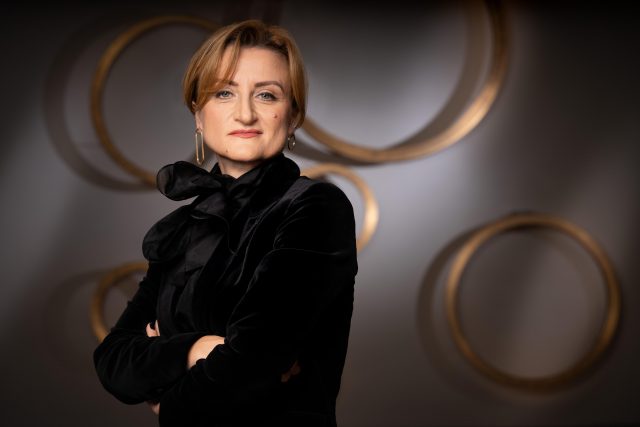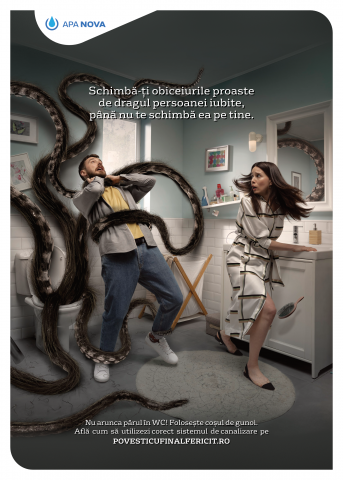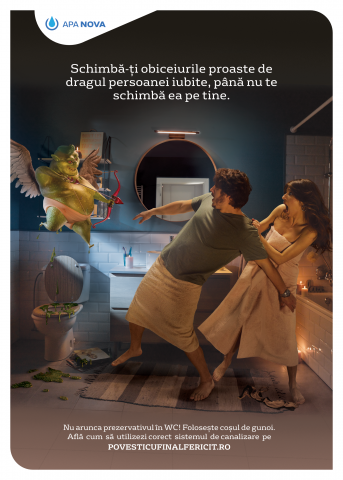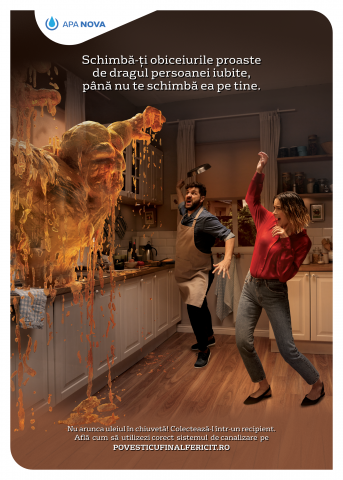Ramona Dumitru (Apa Nova): “We can always change for the better and this is one of our main goals”
„Happy ending stories” is an awareness campaign launched by Apa Nova through which it proposes itself to bring in attention of the people living in Bucharest the importance of the sewerage system, as well as its correct usage. The campaign was develop by the communication agency Porter Novelli. Apa Nova proposed itself to inform the population so that the sewerage system would be treated correctly by eliminating the perception that it can be assimilated to a trash can and the impermissible waste stopped being thrown away in the toilet or in the sinks’ trap.
AdHugger.net found out more pieces of information from behind-the-scene of the campaign and how Apa Nova is approaching the public and the industry at this moment. Ramona Dumitru, Communication Director Apa Nova Bucuresti, answered all our full of curiosity questions.
AdHugger: What is your precise goal with it?
Ramona Dumitru: In the case of „Happy Ending Stories”, our main emphasis is put on responsibility, rather than communication. A new role that most of the brands have acquired in 2019, has been the one as an educator in society. This has been an ascending trend between brands, and Apa Nova Bucharest has taken a part in this by coming forward with the awareness campaign, “Happy Ending Stories”. One of the goals of the campaign is to help shape a present Bucharest, a Bucharest where its inhabitants understand both the responsibilities of living together and its benefits.
AdHugger: How did the Apa Nova – Porter Novelli collaboration begin?
R.D.: The campaign has been developed together with Porter Novelli, which is our communications partner since the beginning of 2018. The partnership has been consolidated following a pitch won by Porter Novelli at the end of 2017. In order to meet our common goals, an organic relationship has been built by developing a common language, between the client and agency.
AdHugger: How hard is it, in your opinion, to change mentalities in Romania and why?
R.D.: As we stated before, it is very difficult to change habits, but it is not impossible. Happy Ending Stories supports the start of behavioral change. The process of change is a long and complex one, and we want this campaign to act as a trigger. The main target of the campaign is represented by the youth and adults. For the young audience, the campaign has an educational role, whereas, for the adult audience, we sought to remind them about the consequences of an inappropriate usage of the sewage system. Overall, we hope to create an association in the mind of the consumer, the moment of choice being the one that makes him think, a moment that is not usually determined or comes from inertia.
AdHugger: You went away from the safe zone with this campaign. Is courage something that defines right now Apa Nova’s advertising style or the campaign had to be different in order to shock/ surprise and determine people to change their behavior?
R.D.: We managed to step outside the comfort zone by prompting a behavioral change, using the most universal feeling: love, and its dark underside: the fear of losing it. In this way, we showed situations on the brink of romantic failure, whose resolution is found in improving behavior. By making use of the existential fear of losing one’s partner, we dramatized daily-life situations that we aim to improve. In order to do that we presented both sides of the story, better yet, two possible outcomes: a happy ending and a not-so-happy-ending.
AdHugger: What was your brief for the agency?
R.D.: The main requirement for the agency was to develop an awareness campaign aimed at reducing the amount of waste that is illegally thrown in the sewer system. Why did we assume this duty? Apa Nova Bucharest manages Bucharest’s water and sewage services for over 18 years and is the first to witness the negative impact of the misconduct that is taking place.
The distinction of the brief comes from the requirements of the core target that had to be reached. The agency was challenged to find a way to surprise and encompass the campaign to all types of stakeholders, as the sewerage system is for anyone to use.
AdHugger: How important is for you to highlight such a problematic situation?
R.D.: The sewer system is very important to our company. And the figures are shocking. In 2018, Apa Nova Bucharest recorded about 18,000 tons of waste. This value increases annually by 500 tons, so the trend is worrying. The most common type of waste that is found in the sewer system are: solidified fats, detergents, textiles, bags, plastic bottles, and food scraps. The operational department has discovered over time all sorts of surprising objects. The consequences of this habit are multiple. First and most important being the water and environment pollution.
This habit also hampers shared living. Over time, the sewer network degrades, causing dysfunctions that cause floods, blockages, bad smells, or other inconveniences.
AdHugger: Why do you believe that right now is the right moment for bringing awareness on the subject?
R.D.: The main reason why Romanians throw waste into the sewer system is the lack of education. They confuse the toilet bowl with a garbage can. Most people living in Bucharest do not know the negative effects of this type of behavior or, if they are aware of them, they just simply ignore the rules. Unfortunately, it is a deeply rooted habit in the collective mind of the population.
The campaign addresses these issues directly, emphasizing the immediate consequences of the action. Basically, the spots, but also the entire structure of the online platform, show us two situations: the one with the happy ending that corresponds to the right choice and the less happy ending, meant for the wrong one.
AdHugger: What were Porter Novelli’s qualities that convinced you to collaborate on the project?
R.D.: Although the brief could have been interpreted in many ways, the agency proposed the alternative that convinced us unanimously at first. We were pleasantly surprised by the agency’s proposition to emotionally approach a “dirty” issue. The solution has been found in a deeply universal sense: love, or more specifically, fear of losing a loved one. Love has the power to change a person’s behavior positively and that’s exactly what we want to achieve through this campaign.
AdHugger: How is the campaign integrating in your overall communication strategy?
R.D.: Responsibility is a key element of the communication strategy. Through this campaign, we intend to transfer this value to our consumers.
AdHugger: Your company repositioned on the market last year. How is this campaign fitting in the new brand image?
R.D.: Apa Nova has undergone a natural process of modernization and renewal, with increased efficiency and performance, both in terms of service quality and in terms of modern processes and customer-oriented organizational culture. “Happy Ending Stories” fits well with these changes and the renewal of the visual identity.
AdHugger: Is this direction of environmental friendly – sustainability attentive going to be kept in the next period of time as well?
R.D.: In each of the projects, campaigns and process that our company has developed over time, the main direction was always to underline the attention to the environment. This is also the case for “Happy Ending Stories” campaign. Future projects will continue to envision the care for the environment that the company has.
AdHugger: Do you intend to continue the campaign in the months and years to come? Why?
R.D.: Yes, the campaign will definitely continue its journey as it was planned for it to progress in two different time frames: 06 June – 18 July and 16 September – 1 November, both in the online environment (34 stands) and TV (5 stations). We chose to create this type of expansive campaign knowing the difficulty people might encounter when changing their habits.
Some find it hard to believe that people’s behavior can change and so we decided to challenge this. We believe in the ever-changing nature of people. We can always change for the better and this is one of our main goals.










